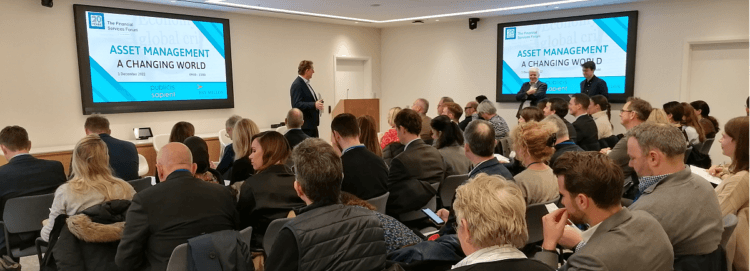The Financial Services Forum hosted over 50 delegates and 10 expert speakers from the asset management industry this week to discuss topics such as technology, innovation and upcoming challenges. Here is a brief summary of some takeaways from the event.
Our next event is coming up on 7th February – register here.
CRM ownership
The first panel discussed CRM strategy, including how it can meet customer demand and where ownership of it should sit within the business.
The panel argued that CRM should be at the heart of everything the business does. However, they noted that getting it right was not a technology challenge but a business one.
Hideki Hashimura, CMO at redk, said that CRM is changing from being perceived as a tactical tool to optimise business processes to a strategic tool to be used to optimise experiences, sharing findings from redk’s recent report. Historically different departments have had their own datasets, but a more holistic approach is needed to unify these sources to achieve a better customer experience.
Colin Bennett, Global Head of Marketing and Client Experience at GAM Investments, noted the importance of governance, saying that an overarching framework is needed to ensure that the data that is being inputted actually makes sense.
He added that placing the data governance team within distribution had allowed that team to work closely with marketing and sales teams.
“They know the impact of good data.”
Brian Stewart, Global Head Customer Insight, Web Experience & Analytics, AXA Investment Managers, explained how salespeople’s reluctance to log every single meeting could be overcome if marketers offered them a value exchange: leads and data in return for their help.
While most of the discussion focused on business processes, Hideki Hashimura noted that this challenge could also be overcome with new technology that helped to automating and streamlining these data entry processes – for example, new voice recognition software can allow details to be transcribed from speech with very few errors.
Innovation
The second session, chaired by Bradley Gamage, Senior Client Partner at Publicis Sapient, focused on innovation. Innovation should be “an outcome, not an objective,” said Malcolm Fried, CMO of Ninety One.
Malcolm explained how the company had revolutionised its approach to content by creating two sets of dashboard. One allows the commissioning of content, including who wants the content and who’s going to produce it. The other looks at how content flows through the digital pipeline and who is using it.
Prior to implementing this, the marketing team were producing more words per week than the FT. The company is now producing a quarter of this volume, to far greater effect.
Malcolm argued against having a dedicated “Chief Innovation Officer”.
“If we centralise innovation we distance that team from those problems,” Malcolm said. He suggested innovation was more likely to come from people who are smart, enthusiastic and close to the problem.
“Ideas are cheap,” said Colin Bennett, who also took part in this panel, discussing how GAM set up an internal company programme called Idea Drop. This is effectively a social media tool which allows members of the team to raise an idea, either from their own initiative or in response to a challenge posed by someone in the company.
Colin says that this has democratised innovation within the business, avoiding it always coming from the ‘SOFA’ (same old faces again).
The company has implemented over 250 ideas in the first year and a half, particularly around people management.
Vincent Hooplot, COO & Chief Strategist, Fundamental Media, emphasised that innovation is about problem-solving. However, the easy part is solving the problem in a small group of people – the hard part is pushing this out to the rest of the company through training and achieving buy-in.
He added that not all ideas become a success, but you only need one or two each year to work.
Threats to asset management
The next session focused on the headwinds to asset management marketers. Asset managers are facing a hugely challenging environment, with Michel Van Oorschot, Head of EMEA Marketing, T. Rowe Price UK noting that in terms of asset flows, Q3 2022 was the worst quarter ever for the industry. Marketers are under particular pressure to demonstrate value and help their business weather the storm.
“Realistically, if budget cuts are coming, marketing is seen as a cost centre – are you essential enough to the company that if the cuts come will they look elsewhere?”
This is in the context of continued pressure to become more sustainable. As Duncan Sparke, Divisional Director at Man Bites Dog, commented, there is probably “less than a decade” to make a transition towards sustainability and waiting for better economic times is not an option.
Courtney Waterman, Managing Director & Head of Global Institutional and EMEA Marketing at Goldman Sachs, said that sustainability needed to be considered in a broader sense than just environmental targets – it is the economic challenge of realising that the economy as it has functioned until this point can’t continue this way indefinitely.
Courtney added that the asset managers which would win in this environment would be those who were able to think beyond product. She noted that each year something that was originally a ground-breaking innovation becomes “table stakes”. Brand offers a way to stand out.
Consumer duty
Ed Knight, Senior Consultant & Financial Services Sector Lead at Signal, closed the conference with a session on consumer duty, explaining in detail how asset managers might address some of the key challenges.
He demonstrated the scale of the task ahead, with research showing that consumer understanding of many financial matters is limited. One test found that the best score in a test of their knowledge was 48%.
He showed that design thinking, including behavioural science, was needed, but this alone wasn’t enough – a full-scale shift from customer communications management to customer experience management is needed.

